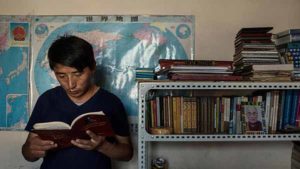
A delegation of Tibetan nomads from Ngaba in Tibetan traditional province of Amdo [Ch: Aba, in Sichuan] sent a letter to the National People’s Congress on April 20, cautioning against Mandarin becoming the primary language of instruction in the area, as per recent government proposals. Radio Free Asia (RFA) reports that the letter argued that such a move would negatively impact “relationships between parents and their children and goes against regional ethnic laws”. The letter continues, saying the consequences will be “far-reaching on future generations of Tibetan students with nomadic backgrounds”, and that “Their welfare and happiness depends on a sound Tibetan education through their mother tongue”. The nomads are also concerned that students currently educated in Tibetan would be disadvantaged at higher levels of education if national college entrance exams are switched to Chinese only.
RFA reported that “Several of the nomadic delegates who signed the letter had published their opinions publicly in the preceding weeks” and quotes one of the delegates, Juchoe Pal from Mewa Gongthang village, as stressing that [the Chinese] trampled upon “the culture and civilization of an entire race with nothing other than a show of contempt.” According to the international non government organisation (NGO) Human Rights Watch (HRW), these education proposals are the latest in sustained efforts by the Chinese Communist Party (CCP) to change the official policy of encouraging cultural diversity, which had been in place since the 1980s, towards greater assimilation for minorities. A recent HRW report found that elementary schools and kindergartens had joined middle and high schools across Tibet in teaching in Mandarin. A 2010 policy from the CCP had centred on a bilingual education in Tibet, promoting Tibetan and Chinese alongside each other, however many schools are nowadays staffed entirely by non-Tibetan-speaking teachers, with few if any textbooks in Tibetan to hand. Consequently, children in Tibet are losing fluency in the Tibetan language as schools ramp up their instruction in Mandarin, according to a report by RFA.

Tashi Wangchuk
Tibetans have consistently protested against China’s cultural upheavals. In 2016, Tibetan language rights campaigner Tashi Wangchuk was sentenced to five years in prison after a Chinese court judged him guilty of “inciting separatism” when seeking to file complaints regarding the lack of Tibetan-language schooling in his district. The forceful spread of Mandarin instruction has been seen across other regions currently under Beijing’s control, including in East Turkistan [Ch: Xinjiang province] where the ethnic minority Muslim Uighurs living there are subjected to similar repressive rule under the CCP as that experienced by Tibetans in Tibet. A key feature there is the Chinese authorities’ “political education” camps where study of the Chinese language is mandatory.




 Print
Print Email
Email